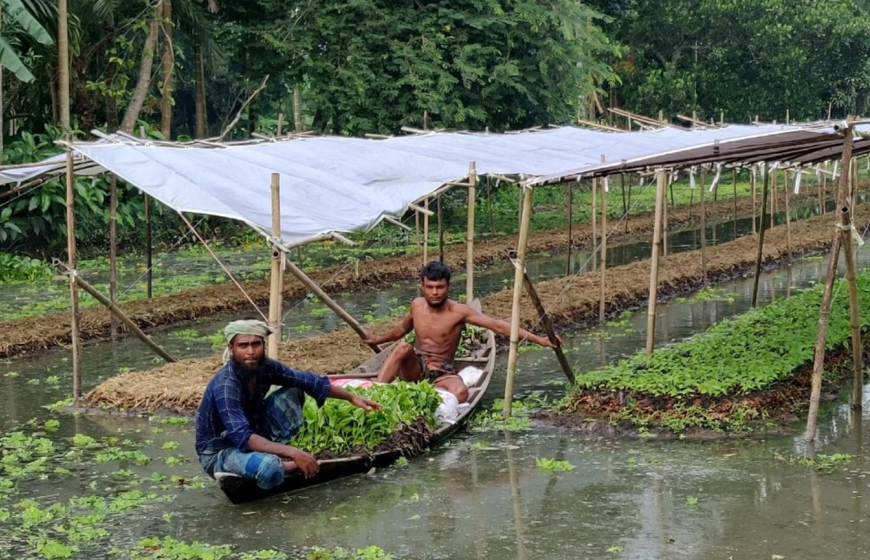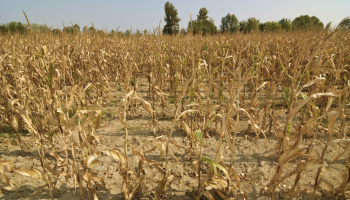
As part of the Saline Water & Food Systems Partnership (SW&FS), three Seed Money projects were launched in 2024 to tackle salinity challenges in Bangladesh, Senegal, and Mozambique. The projects have recently come to an end. They were part of SW&FS’s wider mission of addressing salinity in low and middle-income countries and strengthening collaboration between the Dutch water and agrifood sectors. Below is a summary of the projects and their key results.
The three projects used locally rooted, integrated solutions to strengthen resilience to salinity and lay the foundation for improved food security. They were supported by the Saline Water & Food System Partnership (SW&FS). This is a multi-stakeholder initiative established by the Netherlands Water Partnership and the Netherlands Food Partnership and supported by the Netherlands Ministry of Agriculture, Nature, and Food Quality.
In Bangladesh, the Resilient Roots project was led by a consortium that included the Centre for People and Environ, the Free University of Amsterdam, and Krisoker Sor (Farmers’ Voice).
In Senegal, the ISSM4RICE project was carried out by a consortium including AfricaRice and MetaMeta.
In Mozambique, the MoSARP project was implemented by a consortium including ASSAMBA, ABIODES, Eduardo Mondlane University, Mozambique Institute of Agricultural Research, Weltweit e.V., The Salt Doctors, and the Free University of Amsterdam.
Resilient Roots: Leveraging indigenous practices for salinity adaptation in Southern Bangladesh
In coastal Bangladesh, rising salinity is increasingly threatening agriculture and rural livelihoods. The Resilient Roots project set out to identify indigenous farming practices, crop varieties, and traditional tools originating from three salinity-affected coastal regions: Shyamnagar, Hatia, and Banaripara. The aim was to document these indigenous approaches and assess their potential for wider use. The project also evaluated the feasibility of these practices from socio-economic, ecological, and cultural perspectives. A proposal was developed to validate, scale up, and embed successful solutions through partnerships and policy support.
The project combined surveys, focus groups, case studies, and lab analyses to assess local salinity challenges and indigenous practices in the three regions. The key results were the identification of three salt-tolerant vegetables with high potential for scaling up: gima, kolui, andtorul. Farmers also shared indigenous practices and techniques such as floating farming (Dhap Krishi), protective barriers (Kaite Bera), using cow dung for seed protection (Gobre Beej), and many more. These indigenous practices show strong potential for climate adaptation. However, further research and policy support are needed to scale up and safeguard these locally rooted solutions. Find out more about the Resilient Roots project via this link. The report of the Resilient Roots project in Bangladesh, carried out by the Center for People and Environ, Farmers Voices, and the Free University of Amsterdam (VU) is available here.
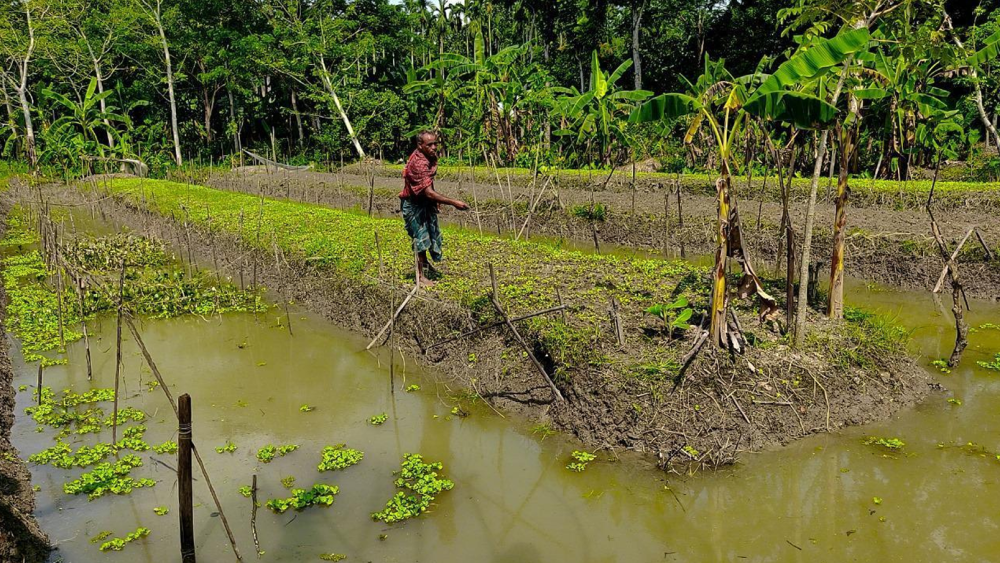
Integrated Soil Salinity Management in rice-based cropping systems in the Senegal River Valley (ISSM4RICE) delta
Soil salinisation is the most pressing form of land degradation in the Senegal River Valley. It significantly threatens rice yields and food security. In response, the ISSM4RICE project promoted integrated soil salinity management in rice-based systems. The initiative focused on joint learning and capacity building to help farmers and extension workers agents adopt cost-effective, adaptive solutions. Activities strengthened practical knowledge and stimulated dialogue among stakeholders. The project also delivered a knowledge product that lays the groundwork for scaling up effective salinity management across the region.
Over 260 farmers and 90 extension agents were trained through Farmer Field Schools across four villages. The hands-on sessions introduced salt-tolerant rice varieties, nutrient management strategies, and improved cultivation practices. Capacity was further strengthened through classroom training and field visits on salinity causes, impacts, assessment, and adaptation. A set of eight French-language manuals was co-developed and shared via MetaMeta’s website, providing practical guidance on salinity management. The project highlighted the value of combining agronomic and community-based approaches and fostered ongoing Dutch-Senegalese collaboration on salinity solutions. Find out more about the ISSM4RICE project via this link. The full report is available via this link.
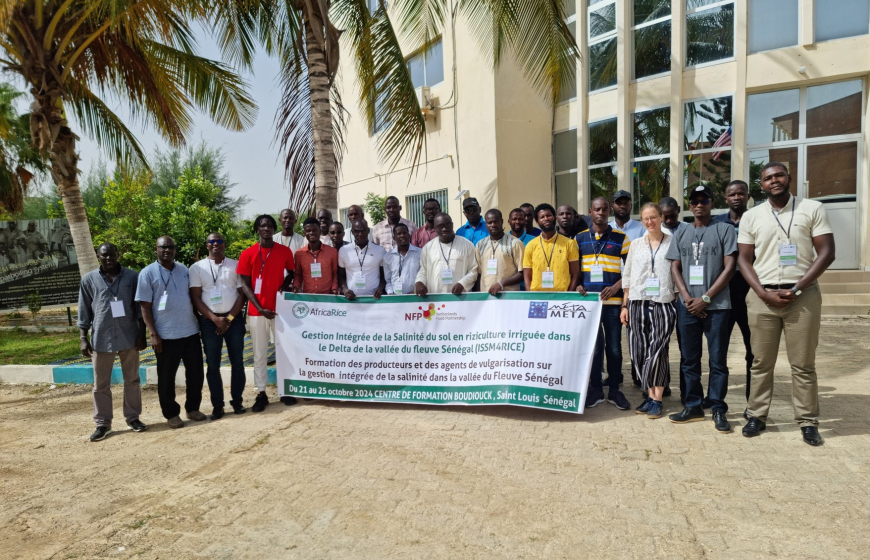
Mozambican Saline Agriculture Research and Practice: Agroforestry Solutions and Training Development (MoSARP)
Mozambique’s coastal regions are increasingly being affected by soil and water salinisation. This has already led to severe land degradation. To address this, the MoSARP project brought together Mozambican, Dutch, and international partners to develop a roadmap for saline-resilient agriculture. The project focused on identifying locally relevant, scalable agroforestry-based solutions for salt-affected coastal farming systems. It also aimed to design a training module tailored to the Mozambican context and which would foster long-term collaboration between local and international actors working on salinity.
The project launched two field pilots in distinct saline landscapes to test adaptive agroforestry practices. Knowledge exchange was facilitated through webinars and workshops involving stakeholders from research, education, NGOs, government, private organisations, and farming communities. An integrated training module was co-designed for students, knowledge institutes, extension workers, and other stakeholders to embed saline agriculture into Mozambique’s educational programmes. MoSARP also fostered new international collaborations. For instance, a research partnership on salinity in rice paddy soils was established between the Mozambique Institute of Agricultural Research (IIAM), Eduardo Mondlane University, and Martin Luther University Halle-Wittenberg. IIAM also explored collaboration on soil spectroscopy and agroforestry with the Centre for International Forestry Research and World Agroforestry (CIFOR-ICRAF). These are just a few examples of the partnerships sparked by MoSARP. To support ongoing regional exchange, a Saline Agriculture working group was established on the Action Network Worldwide platform. Find out more about the MoSARP project via this link. The full report is available via this link.
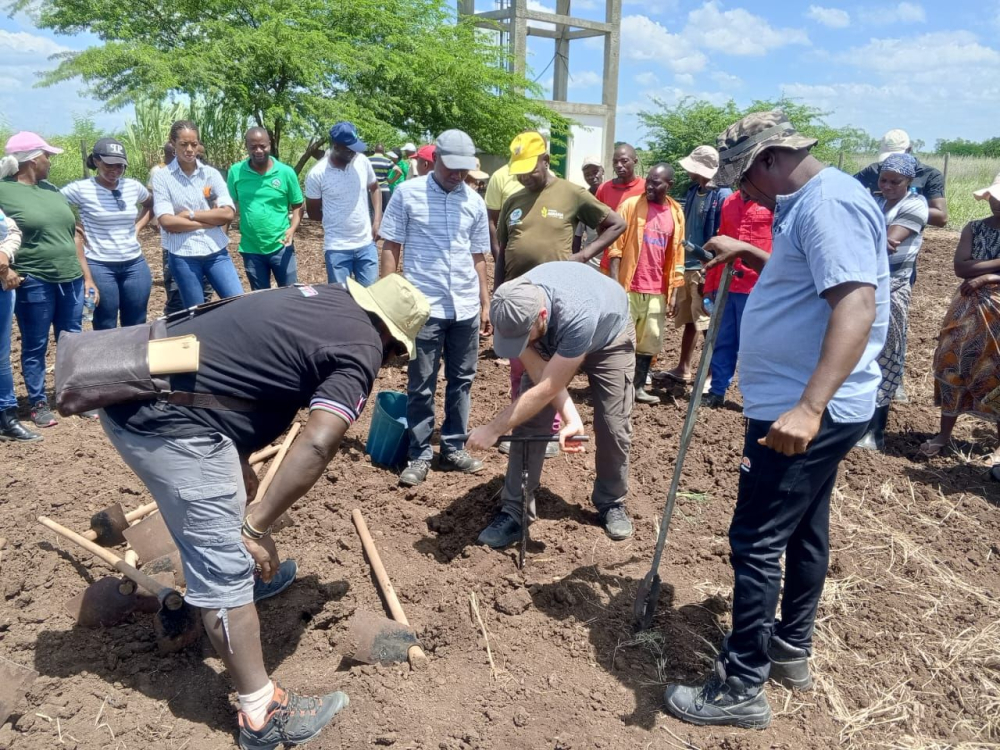
Saline Water & Food Systems
Saline Water & Food Systems (SW&FS) is a multi-stakeholder partnership that stimulates collaboration between the Dutch water and agrifood sectors to address the challenge of salinity in low and middle-income countries (LMICs). The partnership consists of knowledge institutes, diverse members of the business community such as innovative SMEs, and experts operating on the ground. It is supported by the Netherlands Ministry of Agriculture, Nature, and Food Quality. Read more.
